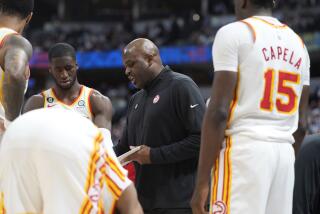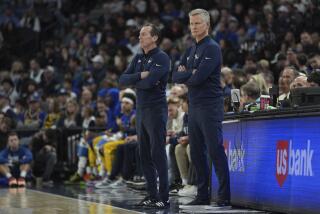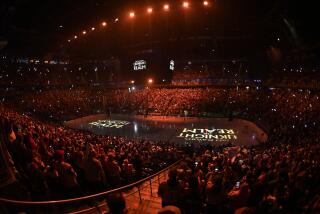It’s No Ordinary Sequel for Brooks
- Share via
This is about the past, all right, but not the past you had in mind.
You think Herb Brooks came back to coach the U.S. men’s Olympic hockey team because he’s stuck in nostalgia mode, because he can’t move past those incredible days in Lake Placid in 1980 when he led a bunch of college kids past the Soviets and on to what might be the most memorable gold-medal victory in U.S. history?
If you do, you’re wrong.
This has as much to do with 1960 as it does 1980. This goes back to the Games in Squaw Valley, when the United States won its first gold medal in hockey.
Back to when Herb Brooks had to watch, as the last man cut from the team.
Back to when he heard his father tell him the team’s success meant that Coach Jack Riley must have cut the right guy.
“That was a very defining moment in my life, as far as goal-setting and defining some of my value systems and things that are important to me,” Brooks said. “I think we can all look back on our life and find a similar moment--[words from a] grandfather, grandmother, teacher, neighbor, whatever--that added to things that we think are very important in our life.
“I think when that happened to me, the lesson my father [taught] me was you don’t know what’s going to happen in the future. We just don’t know. The thing that he was telling me at the time was whatever you’re going to do, you have to make some sacrifices. If you take that alone and spin out all the connotations that that phrase means, then it adds up to determination, attitude, paying the price, ability to rebound and come back. A lot of things come out of that.
“I got no sympathy from my father.”
He did get the same first name as his father. And he got an attitude from him, one that helped Brooks come back and make the Olympic teams in 1964 and 1968 (although the United States did not win any medals those years.)
He coached the University of Minnesota to three national championships in the 1970s. He coached four NHL teams in the 1980s and ‘90s. He was enshrined in the United States Hockey Hall of Fame 12 years ago.
He doesn’t have his name engraved on the Stanley Cup, hockey’s highest honor.
But he was a big part of something that went beyond any single sport. “I give him almost all the credit for what happened in Lake Placid,” said Ken Morrow, a defenseman on the 1980 team. “I felt I was as well prepared as I’ve ever been to do anything under Herb’s guidance. Without him, we wouldn’t have won.”
They won because Brooks gave them the same tough love he received from his father. He told the best college hockey players in the United States that they weren’t good enough to win, so that way they played above their perceived capacity. He ran grueling practices.
Team captain Mike Eruzione considers Brooks a friend now, but, “At the time he wasn’t, because he was the coach. He had to do what he had to do.”
The team was together for only six months, but in that time it played 63 games before the Olympics. Brooks sought out the best competition, including a matchup with the Soviets that left the Americans on the wrong side of a 10-3 score just before the Olympics began.
“What I think people forget is Herb took this team and didn’t do the chicken banquet tour,” 1980 goaltender Jim Craig said. “He didn’t just play college teams that he knew he could beat.”
Brooks’ camp was “an accelerated class on ‘How do I get the most out of each individual?’” Craig said. “It’s almost like [when] you have these CEOs and they want to unify them, so they send them out to Pecos River for rafting.”
Said Brooks: “I tried to get them out of a comfort zone.”
He wanted them to go where he had been, to make them understand about hardship and sacrifice and the high cost of victory. So he made them suffer.
The training was when Brooks made them into winners, defenseman John O’Callahan said.
“I think once we got to Lake Placid, all he had to do was stand back and open the door,” he said.
The Salt Lake Games, the second time the Olympics have featured NHL players, will require a different approach. Brooks will have his team together for only one full practice between the time the league begins its Olympic break and the first U.S. game.
And the players present a different dynamic. They’re pros, and some of them are close to the current ages of the 1980 U.S. hockey team members.
So here are the glaring questions surrounding Brooks: Why scale the mountain again when he already has reached the highest peak? And can his coaching style work with this new scenario, or will he seem as outdated as the loud jackets he wore behind the bench in 1980 look now?
First, the why.
“Number 1, I was asked,” Brooks said. “The Olympic Games are special. The competitiveness is something you look forward to. It’s a thrill to represent your country in the Olympic Games. That would be another reason. And I really look forward to working with the athletes that we have.”
Brooks coached the Penguins as recently as the 1999-2000 season, and he continues to work for them as a scout, so he is familiar with the NHL players.
Several phone calls from Neil Sheehy, a member of the USA Hockey executive committee and a fellow Minnesota resident, were enough to convince Brooks to try again. “They pressed my button,” Brooks said. “They asked for some help.”
“We think he’s the best person out there to coach this team in this type of circumstance, the short time frame, six-seven games,” said Craig Patrick, the general manager for Team USA. “He’s got a great mind. He really wants to do it.”
Said Jim Craig: “I think what people miss is that Herb Brooks is a tremendous bench coach. There are people who are great coaches and preparers. It’s almost like a football coach, these football coaches go in at halftime and readjust. In hockey you don’t have halftimes. You have to be a good bench coach. Herbie does that as good as anybody.”
Brooks says he likes the personalities on this new team, and he wants them to be expressive, for the players to be the show. (In 1980 he didn’t let his players talk to the media).
And as much as he hates today’s psychobabble and how it makes people soft, it sure sounds as if he wants the 2002 players to get in touch with their inner child.
“The pros we have right now have a lot of little boy in them,” Brooks said. “They might be the stars of the National Hockey League, but they have a little boy.”
Maybe that’s how he can make this work. He doesn’t face the staggering odds he did in 1980. The United States has a fair shot in this tournament, as do Canada, Russia, Sweden, Finland and the Czech Republic. But maybe his troops will be inspired and taken back to good memories by the mere sight of Brooks.
“One thing comes to mind: watching him jump up and down and him getting hugged by the trainer in the 1980 Olympics up in Lake Placid,” said Philadelphia Flyer Jeremy Roenick, who will skate for the U.S. in Salt Lake. “That’s the one thing that’s embedded in all American kids’ minds. I look forward to hearing a lot of his stories. I’m sure he’s going to tell a lot of stories from that time and the things that they did to get over that hump.”
There it is. The past again. Lake Placid simply won’t go away.
But you know what? Neither will Brooks, who is 64 years old.
“I think he has a passion,” Eruzione said. “Obviously he can still coach. He’s so competitive, he’d like to give it a shot again and see if he can do it again.”
Besides, he’s playing with house money now.
“Whether they win or lose, it’s not going to affect what happened in 1980,” Eruzione said.
“He’s not out to prove anything to anybody,” Craig said. “He’s not out trying to get a job in the NHL, not trying to advance his career. He’s got all his diplomas.”
Brooks knows the question is out there.
“Some people say, ‘Why go back and compete when you won it before?’” he said. “That’s never entered my mind. And if it does, it would be sort of a sign of maybe a lack of conviction on my part. Nobody’s ever hit 1.000. Babe Ruth sure didn’t.”
So he doesn’t worry about trying to surpass Ruth or even his own status in the collective conscience of a nation’s sports fans. He worries about meeting the standards set by his father.
Brooks has no time for a society of blamers who feel that nothing should tamper with a person’s self-esteem. Would Brooks be a failure if he didn’t win another gold medal? No, he’d be a failure if he didn’t try.
“My father says, ‘Hey go out and do something, accomplish something,’” Brooks said. “Then you’ve got a right to feel good about yourself.”
More to Read
Go beyond the scoreboard
Get the latest on L.A.'s teams in the daily Sports Report newsletter.
You may occasionally receive promotional content from the Los Angeles Times.






